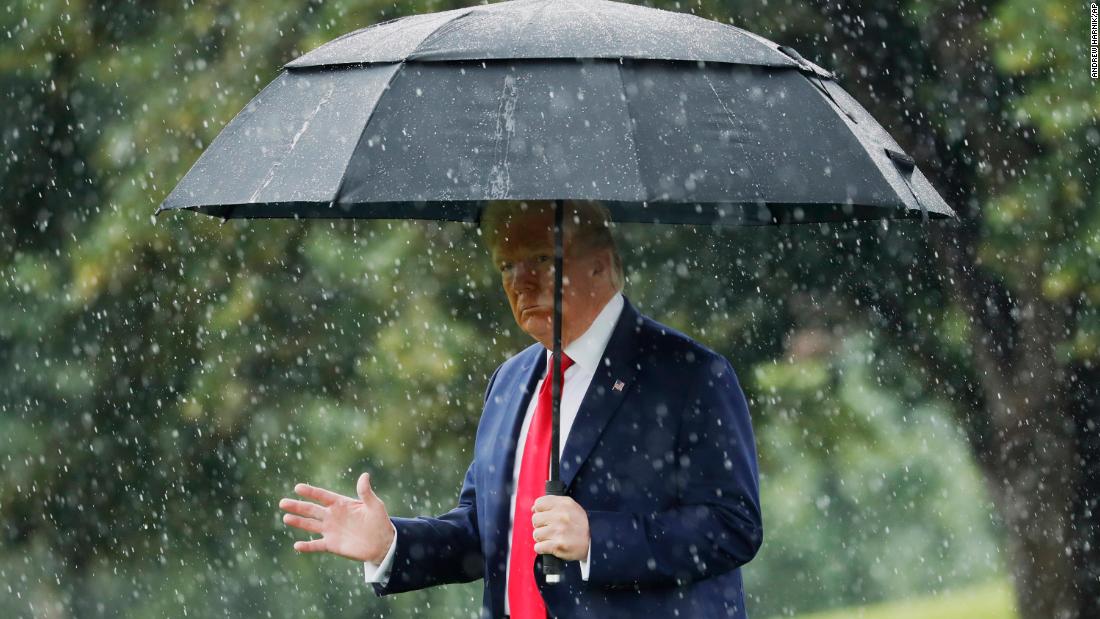The deeper the change in America, the more the President digs into positions that even some of his natural allies have recently forsaken
In essence, he’s arguing that there is something fundamentally un-American and liberal about finally shedding the symbols and imagery of the Civil War, believing systemic racism stains the police force or covering up to prevent the spread of a deadly virus he is trying to wish away.
The President’s conduct is consistent with a lifetime of going against the crowd and his impulse to use racial and cultural flashpoints for his own advantage. At a time when much of the country, even many instinctively conservative individuals and institutions, is engaging in a racial reckoning, he is apparently betting that his stands will ignite and expand his political base and carry him to a backlash victory in November.
As he did with his “Make America Great Again” campaign slogan, Trump is implicitly invoking an idealized past vision of a nation untarnished by political correctness, where white conservative values were dominant, that seems incompatible with an increasingly diverse country. At the same time, he is propagating an alternative reality that the pandemic is over — despite rising cases in many states — to convince voters that the strong economy he was using as his main reelection pitch is on the way back.
But as the President fortifies his culture war positions, he is alienating his own generals, some Republican senators, executives who run sports leagues and Americans who tell pollsters that they are uneasy with his handling of the pandemic and the aftermath of the death of George Floyd.
Trump is also insisting that there is no systemic racism in the police — as he stakes out a “law and order” platform that he believes is attractive to a wider group than just his political base. He said during a trip to Texas on Thursday that National Guard troops cut through protesters in Washington “like a knife through butter” and renewed his vow to “dominate” the streets.
“We have to work together to confront bigotry and prejudice wherever they appear, but will make no progress and heal no wounds by falsely labeling tens of millions of decent Americans as racist or bigots,” Trump said.
Trump seeks to ignite a political backlash
Trump’s instincts are that the “forgotten Americans” who make up his base, and plenty more besides, are angry at and alienated by the current pace of change and the restrictions that have been imposed by governments on their activities during the pandemic. He is deliberately pitting white, conservative older Americans who subscribe to what they might call “traditional values” against the more diverse, more liberal younger sector of the country, which he shocked to the core by beating Hillary Clinton in the 2016 election.
It’s not the first time the President has come out in favor of preserving Confederate imagery — he did so after the controversy over his racially charged comments on the Charlottesville protests several years ago, speaking up for supporters in the South who believe that such monuments are quintessential icons of Southern heritage.
But three years on, Trump appears to be outpaced by the change erupting all around him, and the stakes of his strategy are becoming increasingly high. As polls show that he’s badly trailing Democratic candidate Joe Biden ahead of November’s election, the chances appear to be growing that the President is navigating toward political terrain that cannot provide a foundation for his reelection. His decision to purely serve his base in more than three years in power is facing its most acute test — it’s possible his failure to broaden his support will make a second term impossible.
But the President is sticking to his task, in the apparent belief that his rhetoric is seen very differently outside the elite bubbles on the East Coast. And he’s zeroing in on Democratic vulnerabilities, for instance calls for defunding the police, which he is using to portray Democrats as radicals out of the American mainstream.
Trump puts Republican senators in a tough spot
All day on Thursday, the President’s actions reflected a politician who is convinced he’s tapped into the pulse of the nation, which he says media elites have ignored, even though current polling suggests he may have made a losing bet and is actually narrowing his support.
“My administration will not even consider the renaming of these Magnificent and Fabled Military Installations,” Trump wrote on Twitter on Thursday, characteristically igniting a culture war skirmish that raged all day. The President’s argument that shedding the names of Civil War generals would be disrespectful to troops who trained at such bases and then went off to fight and die in foreign wars makes little logical sense.
But it allows him to pose as the guardian of Southern, conservative values, waging political feuds with establishment elite institutions and opinion formers — a dynamic that he always seeks to create and that has been successful for him in the past.
“There is always a history that we don’t want to forget,” said Sen. Mike Rounds, a South Dakota Republican who sits on the Senate Armed Services Committee and supports the plan. “With regard to that, I agree with the President that we don’t want to forget our history. … But at the same time that doesn’t mean that we should continue with those bases with the names of individuals who fought against our country.”
The next few months — in light of the extraordinary reckoning many white Americans are having about race, perhaps for the first time — will show whether Trump’s strategies will be as successful as they were four years ago. And that leads to one more question, a moral one, over whether a President — the titular head of the nation — should work to reconcile national aspirations of equality rather than standing in the way for his own political reasons.
![]()


